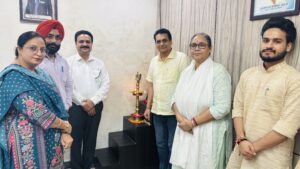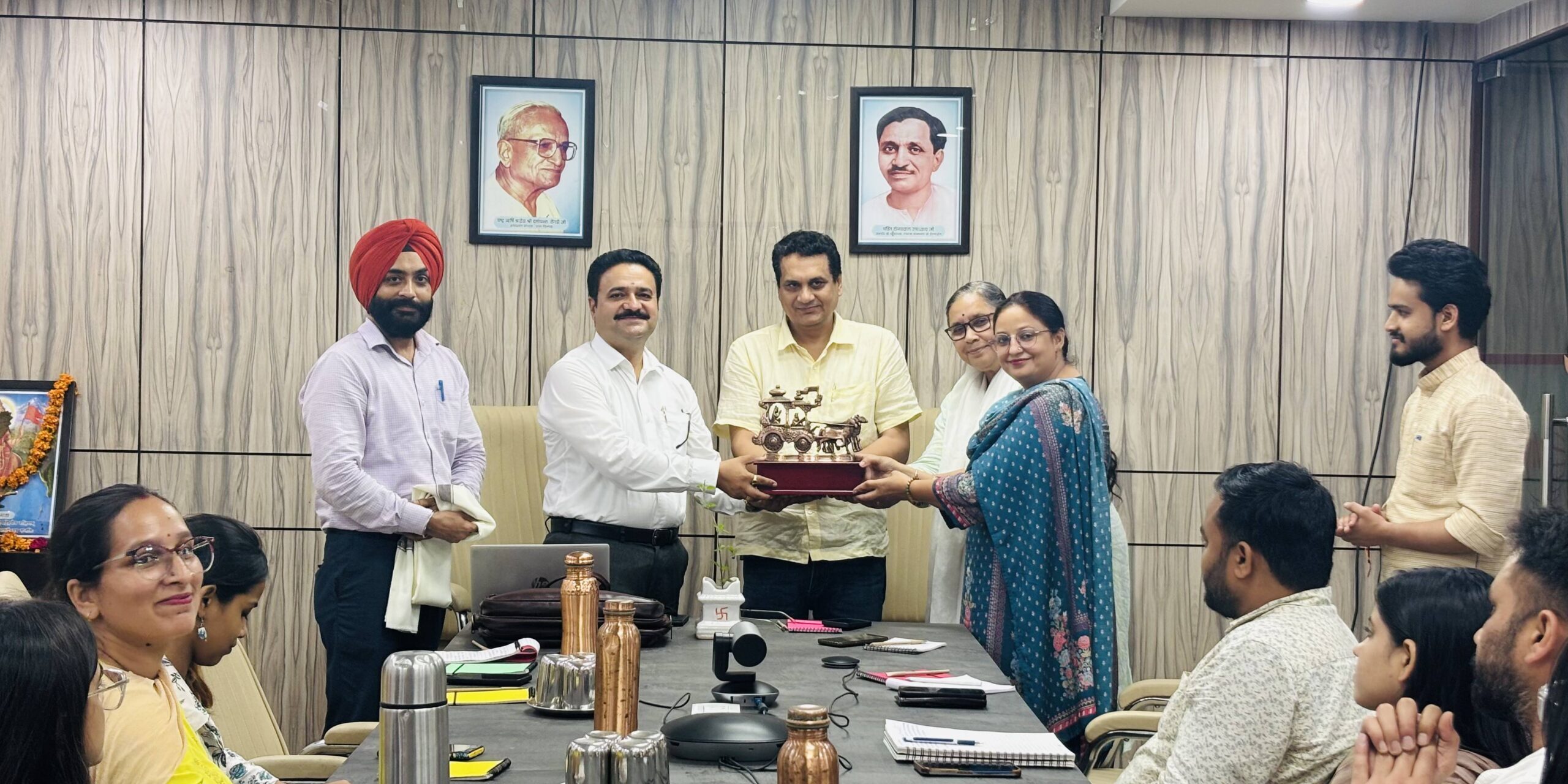Talk on “Punjab: From Sapt Sindhu to Present”
Organized by Swadeshi Shodh Sansthan (Punjab Chair)
Venue: Dharmakshetra, Shiv Shakti Mandir, R K Puram, New Delhi (Hybrid Mode)
Date: August 29, 2025
Time: 05:00 pm
Introduction and Context
Swadeshi Shodh Sansthan, a vision-driven sub-organisation of the Swadeshi Jagaran Manch, conceived with the mission of actualizing a prosperous and great Bharat by 2047, convened this significant discourse. Prof. Pradeep Chauhan, in his welcome address, traced the genesis of the Sansthan, highlighting its report to the finance minister, its formal establishment in 2019, and its role as a crucible for intellectual independence and indigenous research.
Prof. Rajinder Singh introduced the principal speaker, Prof. Ravinder Kumar, Professor of Eminence, Guru Nanak Dev University, Amritsar; Director, Centre for Independence and Partition Studies, University of Delhi; Dean, Culture Council, University of Delhi; and Professor, Department of Punjabi, University of Delhi.
Keynote Address: Prof. Ravinder Kumar

Prof. Kumar commenced the deliberation by congratulating the organizers and underscored Punjab’s exalted antiquity as Sapt Sindhu, the veritable cradle of Indian civilization. Drawing from Dev-Daitya Lok Katha, he elucidated the legacies of the Indus Valley Civilization, renowned for its judicious urban planning and advanced societal structure.
Punjab as Sapt Sindhu: Civilizational Foundations
Rigveda- Prof. Kumar situated the Rigvedic period within the north-western subcontinent, the Sapta Sindhu region, encompassing Punjab, Haryana, western Uttar Pradesh, and the Indus Valley. He enumerated the seven rivers extolled in the Rigveda: Sindhu (Indus), Vitastā (Jhelum), Asiknī (Chenab), Paruṣṇī (Ravi), Vipāś (Beas), Śutudrī (Sutlej), and the celebrated Sarasvatī, revered as the fountainhead of culture and piety. Punjab’s geographical and spiritual centrality is further attested by the composition of the Rigveda on its soil. Quintessential Teachings of Rigveda–
- Unity of the Divine and Truth
- Reverence towards Nature
- Pursuit of Knowledge and Illumination
- Conformity to Cosmic Order (Ṛta)
- Social Concord and Collective Wellbeing
Rāmāyaṇa- Prof. Kumar further highlighted the contributions of Maharishi Vālmīki, the Ādi Kavi, and the author of the Rāmāyaṇa, with connections to Punjab via numerous ashrams and mythic sites. He cited the villages associated with Lov-Kush in Amritsar and Raja Janak in District Moga, attesting to Punjab’s sustained presence in the classical canon. Core Precepts of the Rāmāyaṇa included-
- Supremacy of Dharma
- Relationships anchored in renunciation and devotion
- Triumph of righteousness over evil
- Esteem for women and family cohesion
- Strength through unity, service, and devotion
Bhagavad Gītā- A similar hermeneutic was applied to the Bhagavad Gītā, with its prescriptions for Dharma, selfless action, equanimity, dedication, and ultimate surrender as the route to liberation.
Sri Guru Granth Sahib Ji– A profound reflection ensued on the Sri Guru Granth Sahib Ji, compiled by Guru Arjan Dev Ji at the hallowed precincts of the Golden Temple, Amritsar. Prof. Kumar delineated five cardinal messages:
- Oneness of the Divine (Ik Onkar)
- Human equality without distinctions
- Primacy of Naam, Seva, and Simran (Remembrance, Service, Contemplation)
- Ethical living (Kirat Karni, Sach Dharam), earning honestly, sharing, and righteousness
- Universal love, compassion, and resistance to injustice, emphasizing the spiritual universality of the text
Ethos and Character of Punjab
The talk extolled the poetic impulse of the Punjabi people, characterized by inclusiveness, valor, industriousness, and a penchant for dialogue and debate. These virtues have historically animated Punjab’s resilience and social dynamism.
Contemporary Challenges and Socio-Economic Issues
Paradoxically, the speaker noted emergent rigidity in religious, linguistic, and ideological spheres. Widespread occupational migration, gender imbalances, rural-urban divides, and the insidious spread of self-interest and apathy were critically examined.
Migration and Youth Exodus- The phenomenon of youth migration from Punjab has transcended mere ‘brain drain,’ culminating in a demographic lacuna within villages now inhabited predominantly by elders and children. Historical antecedents from colonial-era military recruitment, Partition trauma, post-1980s instability, to contemporary aspirations for foreign education, have fueled this exodus. Key drivers include agricultural and industrial stagnation, socio-economic malaise, governance deficits, and the valorization of overseas qualifications.
Migration is interpreted not only as a repudiation of local opportunities and governance but as a profound human capital crisis.
Religious Conversion and Marginalization- The surge in conversions, principally among marginalized groups, has deep roots. Initiated during British rule and surging after 2000, conversions are propelled more by social and economic aspirations than doctrinal motive. Missionary outreach, socio-economic support, and escape from caste-based discrimination render conversion a tool for upliftment and agency.
Agricultural Crisis- The talk engaged at length with the unintended consequences of the Green Revolution: monocultural dependence on wheat and rice, depletion of groundwater, unchecked chemical inputs, and resultant economic, ecological, and social emergencies. The decline in agricultural incomes, shrinking landholdings, indebtedness, and the psychological toll culminating in farmer suicides have reconfigured the agrarian fabric and jeopardized youth interest in farming.
Radicalism and Identity Politics- Tracing the historical arc from the Anandpur Sahib Resolution and Operation Blue Star to the present mutations of radicalism, Prof. Kumar noted the amplification of identity-based politics via diaspora mobilization and social media. While electoral ramifications remain limited, the specter of separatism and political equivocation persists. The imperative, he argued, is to marry peace, dignity, development, and employment through prudent governance and robust law-enforcement response.
The Menace of Drugs- The proliferation of narcotics is entwined with Punjab’s geography, its proximity to international drug routes, and its socio-economic vulnerabilities. The transition from opium to synthetic drugs, the collapse of familial checks due to migration, and the nexus between economic distress and substance abuse present formidable obstacles, compounded by complicity within segments of law enforcement and politics.
Synthesis: Interconnectedness of Crises
Prof. Kumar succinctly mapped the interlinkages between agrarian crisis, drug addiction, migration, social marginalization leading to conversion, and the recurring threat of radicalism, identifying the agrarian malaise as the epicenter.
The Way Forward
- Emphasis on agricultural diversification and sustainable cropping
- Revitalization of industry to generate employment and stem migration
- Unyielding governance against drugs and corruption
- Promotion of social justice and Dalit empowerment
- Healing of historical wounds, notably those arising from the cataclysms of 1984
Conclusion
The address concluded by stressing the urgent need for holistic solutions integrating economy, good governance, and social justice. Only by drawing on Punjab’s inherent resilience, moral fibre, and vision can the state overcome its present tribulations and reclaim its ancient lustre.
Proceedings and Closure
A lively discussion followed, with participants engaging in questions and critical reflection. Prof. Rajinder Singh provided a thoughtful summary, while Prof. Pradeep Chauhan delivered the concluding remarks, underscoring the dramatic transformations in Punjab’s agricultural landscape, policy drawbacks, economic indebtedness, and the costly legacies of Partition. The event was formally concluded with a vote of thanks delivered by Prof. Nandini Sinha Kapoor, Director, IGNOU, who expressed gratitude to all speakers, participants, and organizers for their enriching contributions.
Reported By:
Anushka Verma
Researcher, Swadeshi Shodh Sansthan
August 29, 2025






